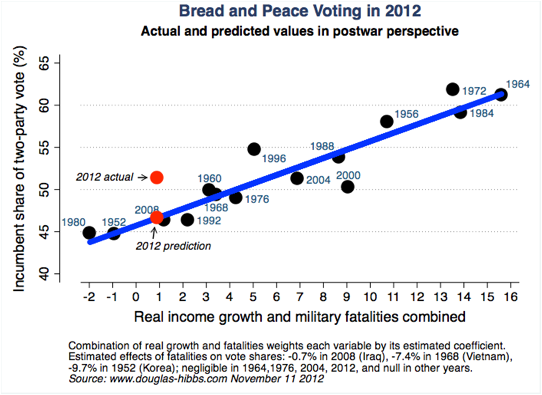In the run-up to the elections, I contrasted the predictions of the poll-aggregators (who base their conclusions on the results of opinion polls) and those of political scientists, who argue that voter preferences are more accurately predicted by the so-called ‘fundamentals’ of the economy like the GDP, the increase of disposable income, unemployment levels, etc., all of which can be measured objectively. We know that the poll-aggregators were very successful in predicting the outcome. So how did the fundamentals models fare?
Note that the fundamentals models only predict the two-party shares of the national vote, not that of the electoral college. I presented the final predictions of these models and they tended to be inconclusive, with some predicting an Obama win and others a Romney win. Similarly, Larry Sabato presented a summary of the predictions of various political science models and found that the average was for 50.3% for Obama (which was not too far off) but with a wide variance.
One model that I paid quite close attention to was the Bread and Peace model of Douglas Hibbs because it was a simple and ‘clean’ model, depending only on growth in disposable income and war casualties. Hibbs was an outlier, predicting on July 31 that Obama would lose with only 47.5% of the two-party vote, and reducing it to 46.6% a week before the election. This was off by about 4-5% from the actual result, which was about two-standard deviations.
Such a large deviation from the expected result calls for an explanation and he has since provided a post-mortem to try and understand why his model was so far off. He says, “Demographic analyses of poll data suggest that partisan cleavage over immigration reform and reproductive rights were the main idiosyncratic issues behind President Obama overcoming the poor re-election prospects implied by weak economic performance.” He is not sure if these two issues that he suspects threw his model off are transient ones that can be shrugged off or are long-term factors that need to be built into the model (though he does not yet know how to quantify them).
As he points out, the point of the fundamentals models is to identify systemic causal factors that influence voters, something that poll-aggregations cannot and do not do. He argues that if every election were dominated by transient factors, then the pattern that the fundamentals models display would be hard to explain. He seems to suspect that the current election result was an anomaly in which Obama hugely over-performed due to idiosyncratic factors, similar to Bill Clinton’s re-election in 1996 and George W. Bush’s election in 2000.


Trying to predict elections with fundamentals is like trying to bet on NFL games against the point spread. It sounds easy, but if people could pick at a 55% rate, Vegas would go broke … and a coin can predict at a 50% rate. This sort of “unified field theory” is a dream for political scientists (and Isaac Asimov in the Foundation trilogy) but unlikely to ever have great accuracy. Presidential elections are too infrequent and circumstances change too much to ever build enough of a database. Poll aggregation though is like betting in a game in the 4th quarter. You have the score -- real data. People try to use past data about a team’s performance in order to make predictions about the future. It implies that you have a deeper knowledge of how something works. But Sherlock Holmes is fiction and nothing beats real data.
So by that model, 3 of the last 5 elections have been anomalies due to idiosynchratic factors?
“Demographic analyses of poll data suggest that partisan cleavage over immigration reform and reproductive rights were the main idiosyncratic issues behind President Obama overcoming the poor re-election prospects implied by weak economic performance.”
Granted a major advantage for Obama (deservedly so) on reproductive rights, perhaps he also misunderestimated the level of fear of ordinary folks about what four years of a republican presidency would do to a fragile economy and to their prospects in particular?
Good grief! The Republicans offended everyone in the general population except the masochrists. I’m surprised the election was so close.